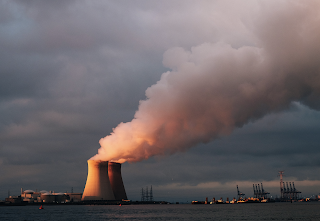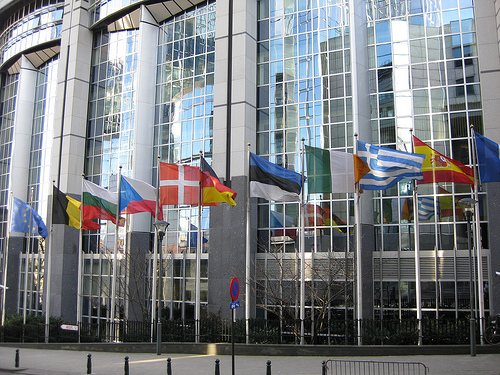by Zsuzsánna Magdó
On March 8th, REEEC in collaboration with the European Union Center hosted Dr. Theodora Dragostinova, Associate Professor of European History at Ohio State University and author of Between Two Motherlands: Nationality and Emigration Among the Greeks of Bulgaria, 1900-1949 (Cornell UP, 2011). Situating herself within a scholarly debate on whether the Balkan Wars of 1912-1913 were the climax of “ethnic unmixing” in the region or not, Dragostinova explored the migration trends of the Greek minority in the early 20th century. Her purpose was to see how the dynamics of political violence developed and how Bulgarian Greeks chose identities and homelands in the periods immediately preceding and following the wars. She looked, more specifically, at the Bulgarian-Greek refugee movements that took place in the period between the signing of the Bulgarian-Greek Convention on Voluntary Migration in 1909 and the Turko-Greek confrontation of 1922-1923.
 |
| Prof. Dragostinova with Prof. A. Bryan Endres, Director of the European Union Center |
The 1903 Iliden Uprising had triggered the influx of approx. 30,000 Macedonian refugees into Bulgaria, who with their anti-Greek sentiments and protests against the situation of Bulgarians in the Ottoman empire, unleashed violence against the Greek minority. While Bulgarian parties initially took advantage of this, Dragostinova argued that the violence against Greeks never became a grass-roots phenomena, most Bulgarians having condemned such treatment of the minority because it tarnished the country’s image in the international press and because many of them in fact considered the Greeks to be their co-nationals. Despite the absence of grass-roots violence, however, the pogroms and expropriations did trigger a large emigration wave in the process of which a quarter of Bulgarian Greeks fled to neighboring countries, especially to Greece. Although it would be tempting to call this “ethnic unmixing,” Dragostinova called for caution. Indeed, the Greek government had actively encouraged such a migration, among others, by giving Greeks the land of expropriated Muslims in Thessaly. Yet, the refugees in fact thought that the Greek state had failed to provide and therefore, they started to return to their “native places.” Since their sense of home was not associated with a Bulgarian or Greek nation-state, Dragostinova argued, their behavior and sense of identity cannot be properly described with the concept of “national indifference.” Rather, as she explained, it was a Greek ethnic identity that was intermixed with a sense of belonging to a more narrowly conceived homeland. In the second part of her lecture, Theodora Dragostinova spun the topic further by looking at Bulgarian Greek migrations in the aftermath of the signing of the Bulgarian Greek Convention (1919). As in the case of the minority’s reverse migration in the 1910s, Dragostinova’s figures showcased some surprising trends. Among these was the reluctance of Bulgarian Greeks to emigrate (up until the 1922-1923 Turko-Greek confrontations) even though under the supervision of the League of Nations the convention allowed voluntary migration and provided compensation for property left behind.
In light of this history of Bulgarian Greek reluctance to ethnically unmix, the Balkan wars seem an aberration rather than a climax, Dragostinova argued. In fact, her overall work shows that national identity remained in flux even in the last decades of the Ottoman Empire, as both ethnic Bulgarians and members of the Greek minority continued to appreciate local solidarity and made pragmatic choices based on economic interest, family considerations or sometimes based on the wish to avoid conscription. Ultimately, her research also underscores the fact that the nation-states themselves stood in the way of national homogenization since, as the example of the Greek state shows, they were not able to absorb the populations they desired.
Zsuzsánna Magdó is a Ph.D. Candidate in History and the Outreach Assistant at the Russian, East European and Eurasian Center, University of Illinois in Urbana-Champaign.




















